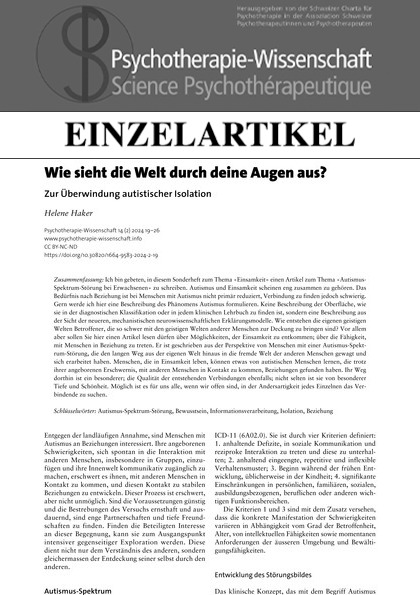Wie sieht die Welt durch deine Augen aus?
Zur Überwindung autistischer Isolation
DOI:
https://doi.org/10.30820/1664-9583-2024-2-19Schlagworte:
Autismus-Spektrum-Störung, Bewusstsein, Informationsverarbeitung, Isolation, BeziehungAbstract
Ich bin gebeten, in diesem Sonderheft zum Thema «Einsamkeit» einen Artikel zum Thema «Autismus-Spektrum-Störung bei Erwachsenen» zu schreiben. Autismus und Einsamkeit scheinen eng zusammen zu gehören. Das Bedürfnis nach Beziehung ist bei Menschen mit Autismus nicht primär reduziert, Verbindung zu finden jedoch schwierig. Gern werde ich hier eine Beschreibung des Phänomens Autismus formulieren. Keine Beschreibung der Oberfläche, wie sie in der diagnostischen Klassifikation oder in jedem klinischen Lehrbuch zu finden ist, sondern eine Beschreibung aus der Sicht der neueren, mechanistischen neurowissenschaftlichen Erklärungsmodelle. Wie entstehen die eigenen geistigen Welten Betroffener, die so schwer mit den geistigen Welten anderer Menschen zur Deckung zu bringen sind? Vor allem aber sollen Sie hier einen Artikel lesen dürfen über Möglichkeiten, der Einsamkeit zu entkommen; über die Fähigkeit, mit Menschen in Beziehung zu treten. Er ist geschrieben aus der Perspektive von Menschen mit einer Autismus-Spektrum-Störung, die den langen Weg aus der eigenen Welt hinaus in die fremde Welt der anderen Menschen gewagt und sich erarbeitet haben. Menschen, die in Einsamkeit leben, können etwas von autistischen Menschen lernen, die trotz ihrer angeborenen Erschwernis, mit anderen Menschen in Kontakt zu kommen, Beziehungen gefunden haben. Ihr Weg dorthin ist ein besonderer; die Qualität der entstehenden Verbindungen ebenfalls; nicht selten ist sie von besonderer Tiefe und Schönheit. Möglich ist es für uns alle, wenn wir offen sind, in der Andersartigkeit jedes Einzelnen das Verbindende zu suchen.
Zitationsvorschlag
Ausgabe
Rubrik
Lizenz

Dieses Werk steht unter einer Creative Commons Namensnennung - Nicht-kommerziell - Keine Bearbeitung 3.0 International -Lizenz.
Diese Zeitschrift bietet freien Zugang (Open Access) zu ihren Inhalten, entsprechend der Grundannahme, dass die freie öffentliche Verfügbarkeit von Forschung einem weltweiten Wissensaustausch zugutekommt.
Autor:innen, die in dieser Zeitschrift publizieren möchten, stimmen den folgenden Bedingungen zu:
- Die Autor:innen behalten das Copyright und erlauben der Zeitschrift die Erstveröffentlichung unter einer Creative Commons Namensnennung Lizenz, die es anderen erlaubt, die Arbeit unter Nennung der Autor:innenschaft und der Erstpublikation in dieser Zeitschrift zu verwenden (gemäß der Creative Commons Attribution-NonCommercial-NoDerivs 3.0 DE-Lizenz).
Die Autor:innen können zusätzliche Verträge für die nicht-exklusive Verbreitung der in der Zeitschrift veröffentlichten Version ihrer Arbeit unter Nennung der Erstpublikation in dieser Zeitschrift eingehen (z.B. sie in Sammelpublikation oder einem Buch veröffentlichen).


